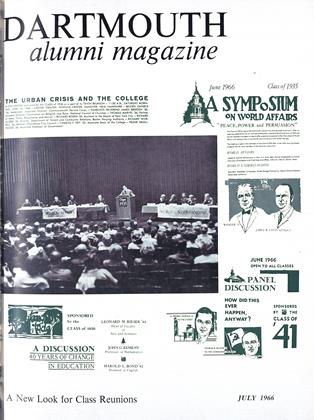By Prof. James Barros (Government). Princeton, N. J.: Princeton University Press, 1965. 339 pp. $7.50.
Professor Barros has written an expert case study in international politics. His case is the Corfu incident of 1923, the first test of the League of Nations by the Fascist dictators. His thesis is that international organizations are as strong and effective as nations, and particularly the major powers, want them to be. His conclusion is that the League, almost from the beginning as the Corfu incident illustrates, did not have the combined support of the major powers and thus was foredoomed as an instrument of collective security and peaceful settlement of disputes.
The Corfu incident broke out with the assassination, in Greece, of General Enrico Feltai and other Italian members of a commission sent to mark the Albanian-Greek border The commission was appointed by the Conference of Ambassadors set up by the allied powers in 1919 to execute the details of treaty settlement after World War I. In response to the murders, Mussolini recently come to power in Italy, forwarded a harsh ultimatum to the Greek government. The ultimatum rejected by Athens, Mussolini proceeded to bombard and occupy Corfu, holding the Greek island as hostage until he received satisfaction of his claims. Professor Barros follows the case from the dispatch of the border commission, through the killings, the Italian action, the attempt by Greece to bring the matter to the League Council as a threat to peace, Italy's success in keeping the affair under the jurisdiction of the Conference Ambas- sadors, the positions of Britain and France during' the delicate negotiations leading to a settlement, and finally the withdrawal of Italian forces from Corfu on the payment of a heavy indemnity by the Greek government.
What makes Professor Barros' study especially significant is the unusually rich documentation he sought out and the judicious use to which he put this material. He has examined the complete diplomatic records for the case in the archives of the League of Nations, the Conference of Ambassadors, and the Italian and Greek foreign offices. He also had access to important private papers of several of the principal British participants. While no French materials were available, a good deal of the French position was evident in the files of other parties.
The result is a marvelous opportunity to examine the diplomatic process at several levels, the interplay of domestic politics and foreign policy, and the relation of national policies to international institutions. Professor Barros makes the documents speak with little interpretation; he rarely intervenes. But when he does, in his concluding chapter, his analysis is sound. If he emphasizes that policy is made by national governments rather than international organizations, he also suggests that the very presence of League (and today the United Nations) has an effect on the positions of individual states. But what that effect will be is highly dependent on the complex set of factors, domestic and international, in any particular case. The Corfu Incident illuminates these factors in clear detail.
Professor of Government
 View Full Issue
View Full Issue
More From This Issue
Books
-
 Books
BooksTHE ELECTRIC-LAMP INDUSTRY
December 1949 By H. L. Duncombe Jr. -
 Books
BooksFILM IN THE THIRD REICH.
JANUARY 1970 By J. BLAIR WATSON JR. '21h -
 Books
BooksAn Algebra Among Cats
October 1975 By J.H. -
 Books
BooksEIGHTEENTH CENTURY STUDIES PRESENTED TO ARTHUR M. WILSON.
NOVEMBER 1972 By JOHN HURD '21 -
 Books
BooksTHE EPIC OF INDUSTRY
JUNE, 1928 By Robert E. Riegel -
 Books
BooksPictorial Florilegium
March 1976 By ROBERT L. MCGRATH








